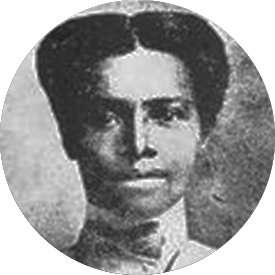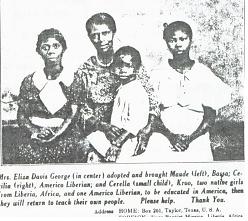My African brother is calling me;
Hark! Hark! I hear his voice.
In a land more dense with work I see
That work is now my choice. *
For over six decades Eliza Davis-George ministered to her African brethren in Liberia. She endured poverty and hardship for the sake of taking the Gospel to her people. Though she constantly had to labor to get support she never wavered from her call. Today thousands of her spiritual children are glad for their Mother Eliza.
Liberia. She endured poverty and hardship for the sake of taking the Gospel to her people. Though she constantly had to labor to get support she never wavered from her call. Today thousands of her spiritual children are glad for their Mother Eliza.
Eliza Davis-George was born in Texas on January 20, 1879. She was the third child of the eleven children of Litt and Jane Davis who were former slaves. Eliza had wonderful memories of her mother who prayed often. Her father struggled financially and nearly ruined the family with gambling. One day he was convicted of his sin at their Baptist church and changed his life. He was a faithful deacon and preacher after that.
Though she was raised in the Baptist church, Eliza did not make a decision to accept Christ for herself until she was sixteen. She faithfully attended church services. Eliza had many suitors but she rejected them all because she was sure that God had something special for her.
In 1900 the Davis’s struggled again as the boll weevils destroyed their crops. Eliza wanted to go to school but it was hard enough being black let alone a poor woman. She worked hard and her family helped out and eventually Eliza received a teaching diploma. Eliza earned her teaching certificate and then was accepted on the faculty of Central Texas College. She taught for five years and then the school asked her to be the matron.
On February 2, 1911, Eliza attended a faculty prayer meeting. Rev. Hill prayed for countries all around the world. Eliza was filled with an overwhelming desire to go to Africa and see her brothers and sisters. She told the president of the college about her strong call but he discouraged her from going.
Eliza knew that she had heard the call from God. The poem at the beginning of this post was the first stanza of a poem that she wrote while she was struggling with her decision about going to Africa.
The leaders at the college did not want to release her and they gave her a hearing. They were doubtful about sending her. She recited her poem to them (9 verses in all). The beginning of the second verse said:
Would you say ‘stay’ when God said ‘go’
To that dark foreign land and
Spread the light? Would you say ‘no’
That bright their souls might stand? *
 Eliza continued reciting her beautiful poem. The leaders were convinced. They decided to release her with their blessings and prayers.
Eliza continued reciting her beautiful poem. The leaders were convinced. They decided to release her with their blessings and prayers.
The Baptist mission could not support Eliza at that time. She prayed and worked hard. Few offered her any help but then Eliza met Rev. James Kelly, the corresponding secretary of the General Baptist Convention of Texas. Rev. Kelly took Eliza around to the churches to raise support.
Finally, Eliza was ready to travel to New York. A ship left from there for Liverpool on December 12, 1913. Eventually Eliza reached Liberia where she and another missionary opened a school for children.
Eliza was concerned about real-life training as well as spiritual training. She called her school the Bible Industrial Academy. Soon they had fifty pupils. In only two years she saw over 1,000 people accept Christ in nearby villages.
Eliza always lived on very little money, but God gave her the support she needed, often just in time to stave off much hardship. About five years after she was in Liberia the mission board stopped supporting her. Some months before this, Eliza had met a medical missionary, Dr. C. Thompson George. Dr. George desired to work as a missionary in Liberia too. He urged Eliza to marry him so that together they could serve God in Liberia.
Eliza did not want to leave Liberia and so she agreed and they were married in 1919. They lived in Kelton. Eliza had already adopted an orphan named  Maude who was a teenager by then. The George’s also adopted Cecelia and Cerella. It was Maude who brought Cerella home to Eliza when she was just a baby. Of course tender-hearted Eliza wanted to care for her. Girls were very badly treated in Liberia. Eliza wanted to give Cerella a chance.
Maude who was a teenager by then. The George’s also adopted Cecelia and Cerella. It was Maude who brought Cerella home to Eliza when she was just a baby. Of course tender-hearted Eliza wanted to care for her. Girls were very badly treated in Liberia. Eliza wanted to give Cerella a chance.
Later another girl named Cecelia came to the school seeking an opportunity to join the mission. And so in 1929 Cecelia joined the group. Cecelia remained a faithful, caring daughter even up to the end of Eliza’s life.
Maude and Cerella went to the United States for their education, not returning for thirteen years. Eliza carried on the work at the mission and prayed for her girls.
After returning to Liberia, Maude helped Eliza (now in her sixties) with the school. Maude died unexpectedly in 1947. She had been running the school in Liberia for two years. Cerella married a man in Greenville and went to work in a bank.
Cecelia would eventually marry and have three children. She would serve in Liberia for a few years, later being joined by her husband when he finished his missionary training. Later they returned to the United States when they could not endure the fever-inducing illnesses of Liberia. Though back in the USA Cecelia continued to help Mother Eliza with support whenever she could.
Sadly, Eliza’s marriage was full of conflict. Dr. George had many problems including drinking. He could be moody and mistreat the children. After twenty years of marriage Dr. George died of an illness in 1939. Eliza was on her own again.
Mother Eliza had also welcomed a young man into their group. His African name was Doh, but he took a different name when he decided to join the Christian church – Augustus Marwieh. He would be affectionately called Gus.
Gus was a good student and even at the age of fifteen was beginning to get a reputation as a preacher. He would become the spiritual son who would carry on Eliza’s work in Liberia and other parts of Africa.
Some years later Mother Eliza wanted to send Gus to America to college. He was very bright and deserving of a good education. He had completed his high school education in Liberia at the top of his class. It was difficult to raise the money and obtain all of the visas necessary, but Mother Eliza persisted as she always did. So now at the age of seventy-four Mother Eliza went to California with her spiritual son.
When Gus graduated from college, Eliza had a long talk with him. She encouraged him to marry a girl from Liberia so that he would have more credibility with his people when he went back to minister there. Eventually he married Otheliah, one of the spiritual daughters at the mission. Much in love, the couple served faithfully together even through some dire hardships.
Gus had also obtained an MRE (Master of Religious Education) at Golden Gate Seminary. After six years in the United States, Gus returned to Liberia. He would eventually serve there for many years, taking over Mother Eliza’s work as she grew old.
One day Gus had exciting news, or so he thought, for Eliza. The Southern Baptists had decided to make a 30-minute program about her work in Liberia. Eliza was aghast, but Gus finally talked her into it. The show was televised in 1963 when Mother was eighty-four years old.
In 1978, Mother Eliza was still going strong at the age of ninety-nine. She went to Texas to continue her deputation schedule. She encouraged young people to go on the mission field.
Several months later she broke her hip. Her adopted daughter Cecelia moved her into a nursing home nearby in Tyler, Texas. On January 20, 1979 Mother Eliza celebrated her one hundredth birthday. She attended the local Baptist church, even giving a speech.
A few days later Mother was rushed to the hospital with pneumonia. Cecelia stayed at her side until Mother went home to be with the Lord on March 8, 1979.
Mother Eliza had witnessed the conversion to Christianity of thousands of Liberians. Gus would carry on the work. He founded the Africa College of Evangelism. He moved to Monrovia in 1982 where he ministered to government officials and business leaders.
Gus appeared on Dr. Schuller’s TV program. Gus also started a prison ministry, a ministry for children, a missionary training school, and a technical high school just like the one Mother George started.
Mother George’s former students were responsible for planting and serving in hundreds of churches. Truly thousands of her spiritual children “rise up and bless her.”
*This Poem quoted in: “When God Says Go: The Amazing Journey of a Slave’s Daughter” by Lorry Lutz, pgs. 44,45.

